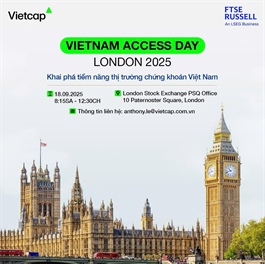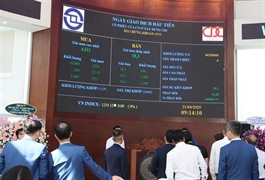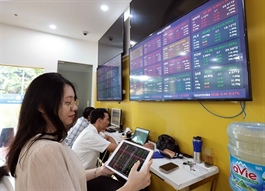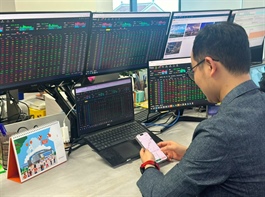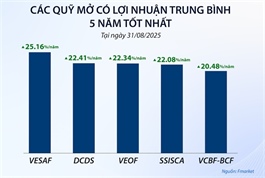Vietnam edges closer to long-awaited market upgrade
Vietnam edges closer to long-awaited market upgrade
Vietnam’s long pursuit of an equity market upgrade is now approaching a decisive period.
According to FTSE Russell’s announcement on September 5, Vietnam has a strong prospect of being upgraded from frontier market to secondary emerging market status.
“As of March 2025, Vietnam remains on FTSE’s Watch List and is being assessed for a possible reclassification. The results will be announced in the upcoming review,” the organisation noted.
The next update will come when FTSE releases its September 2025 Equity Country Classification Annual Report after the US market closes on October 8 (Hanoi time).
FTSE’s classification process is conducted on a rolling basis, with economies placed on a list when under review for potential reclassification across its four categories: developed, advanced emerging, secondary emerging, and frontier.
For Vietnam, the ambition to graduate from the frontier group has influenced policy direction for several years. A range of reforms has been introduced to satisfy FTSE’s criteria, many of which respond directly to concerns expressed by international investors.
Evidence of this progress was highlighted in a recent HSBC report, which assessed Vietnam as having already met seven of the nine conditions in FTSE’s ‘Quality of Markets’ framework.
Requirements on market capitalisation, liquidity, and the presence of large listed firms have been comfortably achieved. The two remaining conditions, the settlement cycle and costs associated with failed trades, are also advancing, with obstacles gradually being dismantled.
According to the report, a significant shift came with the amended Securities Law, effective from late 2024. The law removed the pre-trade cash deposit requirement and introduced mandatory English-language disclosures. Both measures had long been identified by investors as barriers to broader participation. The technical infrastructure has also been upgraded with the launch of the KRX trading system in May.
“Market developments are leaning towards an upgrade. Vietnam’s benchmark stock index has risen by about 40 per cent since the start of the year, placing it among the strongest-performing indices worldwide,” HSBC noted. “This performance reflects sustained investor participation, supported by solid domestic liquidity and continued reform progress.”
Nevertheless, HSBC cautioned that FTSE’s decision will not depend solely on technical compliance. The organisation also consults global investors and brokers, meaning that reforms must not only exist in law and regulation but also generate confidence in practice. Predictability, transparency, and operational consistency will therefore be decisive in the October review.
If an upgrade is confirmed, implementation typically spans 6-12 months, giving global funds time to rebalance portfolios. HSBC estimates that Vietnam could pull in more than $10 billion in additional inflows, covering both passive and active investment, once included in the secondary emerging market indices.
Encouraging signals have also come from FTSE’s leadership. Speaking in the central city of Danang in late August, Wanming Du, FTSE’s director of Policy, pointed to Vietnam’s rapid reform trajectory. She noted that in just two decades, the country has advanced from a frontier market to a regional leader in liquidity.
“The next chapter is about building a more balanced ecosystem, one that supports long-term growth and unlocks economic potential,” Du said, adding that FTSE indices, which underpin trillions of US dollars in assets, are managed under a transparent and rigorous classification system.
Du added that FTSE’s involvement goes beyond periodic assessment. “We do not just evaluate markets, we help shape them. Vietnam is advancing rapidly with regulatory reforms, digital innovation, and sustainable finance, making it one of the world’s most attractive investment destinations. FTSE is not here only to assess but to work in close partnership,” she said.
Domestically, policymakers have reaffirmed their determination to secure the upgrade. At the Ministry of Finance’s (MoF) quarterly briefing in July, Hoang Van Thu, vice chairman of the State Securities Commission (SSC), confirmed that Vietnam’s target is to achieve the reclassification this year.
“Securing the market upgrade this year is a strong determination from our regulators. We are making every effort to ensure Vietnam meets the required standards,” said Thu.
In order to support this, the MoF and SSC have introduced a series of measures. A draft amendment to Decree No.155/2020/ND-CP requires all public companies to disclose their foreign ownership limits within a year of enactment, improving transparency.
In parallel, revisions to the Law on Investment and related decrees are being prepared, particularly to raise foreign ownership caps in non-sensitive sectors, a long-standing request from international investors.
- 10:29 16/09/2025





